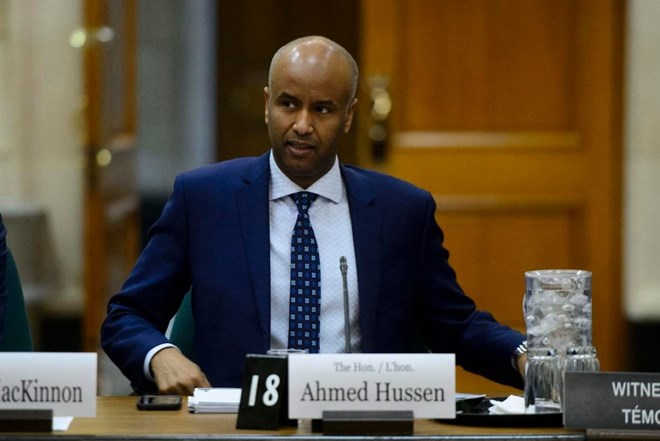
By JESSE BEATSON
KYLIE SIER
Tuesday April 10, 2018

Immigration Minister Ahmed Hussen recently said that he has “no qualms about using the term [illegal]” with regard to certain border-crossings. (SEAN KILPATRICK / THE CANADIAN PRESS)
We are concerned about a recent spike in the use of the term “illegal” to characterize asylum seekers crossing the Canada-U.S. border.
One newspaper speaks of “illegal migrants” while others focus on “illegal border crossers.” An editorial from a prominent national paper asks Prime Minister Justin Trudeau to “yield to Tory measures” by tightening the border. Immigration Minister Ahmed Hussen recently said that he has “no qualms about using the term [illegal].” As MPs Jenny Kwan and Gary Anandasangaree have both argued, word choice is important and the term “illegal” is harmful.
“Irregular” is used by the Immigration and Refugee Board of Canada to describe border crossings “between ports of entry.” This is not about people trying to sneak across the border undetected, but about the right to seek asylum from persecution. The Universal Declaration of Human Rights protects this right. Importantly, the 1951 Refugee Convention and the 1967 Protocol, to which Canada is a signatory and which are incorporated into Canadian law, both recognize that refugee claimants should not be penalized for irregular entry to seek refuge.
Many news pieces that talk about “illegal migrants” or “illegal border crossing” fail to mention an important context - the Safe Third Country Agreement (STCA) with the United States. The agreement, which came into effect in 2004, requires Canada to send refugees back to the U.S. if they come to an official port of entry in all but a few circumstances. This agreement only applies to refugee claims made at official border points, and is premised on the assumption that the U.S. is a country that protects the rights of refugee claimants. Given the current Trump administration’s anti-refugee and anti-Muslim policies, there is good reason to think the U.S. is not currently a safe place of return.
Applying the term “illegal border crossing” to refugees is based on a misconception. Irregular entry is not an offence in the Criminal Code, and should not be labelled as such. The language of illegality also tends to violate the presumption of innocence. This is a principle that should inform ethical journalism.
We should recognize that many so-called “illegal border crossers” will become long-term and integral members of Canadian society. If people come without a well-founded fear of persecution, they will be sent home. But if they do have legitimate grounds for refugee protection and are legally entitled to remain, there is a strong public interest in their eventual integration. Using criminalizing language makes this transition more difficult. As refugee law scholar Harold Bauder writes, the language we choose “can also shape the way civic society, employers, and communities engage refugees and immigrants in everyday life.”
Refugees often lack access to the press and to podiums, so their public image and identity tends to be defined by others. Stigmatizing labels embolden a populist politics that positions refugees as outsiders, burdens, and potential criminals. These labels in turn support problematic policies by making it easier to scapegoat refugees for social ills they are not responsible for.
We stand against a term that divides refugee claimants into “good” and “bad”, “deserving” and “undeserving”, and that removes the dignity of those exercising their fundamental rights to claim asylum and start a new life. There is a great responsibility for those with elevated voices to not prejudge and malign refugee claimants as “illegal.”
Jesse Beatson and Kylie Sier are Osgoode Hall Law School students writing on behalf of the Immigration Division students at Parkdale Community Legal Services.